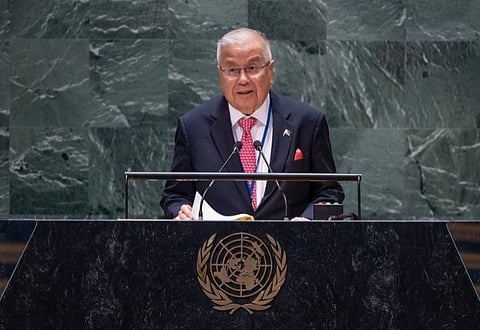
- NEWS
- the EDIT
- COMMENTARY
- BUSINESS
- LIFE
- SHOW
- ACTION
- GLOBAL GOALS
- SNAPS
- DYARYO TIRADA
- MORE

The Philippines has delivered a strongly-worded speech against China before the United Nations General Assembly, accusing the superpower of a “gross distortion” of the UN Convention on the Law of the Sea (UNCLOS).
Ambassador Antonio M. Lagdameo, Permanent Representative of the Philippines to the UN in New York, delivered the speech at the 51st plenary meeting of the 79th session of the UNGA on Wednesday.
Lagdameo asserted the country’s sovereignty over Bajo de Masinloc, also known as Scarborough Shoal, which lies 120 nautical miles from Zambales, well within the country’s 200-mile exclusive economic zone, but which is also claimed by China.
“Bajo de Masinloc has always been an integral part of the territory of the Philippines. Only the Philippines, in the exercise of its sovereignty, has the right to establish baselines in the breadth of the territorial sea around Bajo de Masinloc, in line with the United Nations Convention on the Law of the Sea,” Lagdameo said.
He asserted that multilateralism is underwritten by a rules-based order governed by international law and informed by the principles of equity and justice that safeguard the rights of all states, quoting Foreign Affairs Secretary Enrique Manalo.
He stressed that the emergency facing the sea is a reminder to uphold the rule of law, especially in addressing the drivers that apply pressure on it, such as disputes over access to resources and maritime boundaries.
Lagdameo stressed that the 1982 UNCLOS and the binding 2016 Arbitral Award on the South China Sea constituted the foundation of the Philippines’ policy on the South China Sea.
“In compliance with UNCLOS, the Philippines enacted this year two landmark laws: the Philippine Maritime Zones Act and the Philippine Archipelagic Sea Lanes Act,” he said.
“With these, we reinforce the alignment of our domestic laws with UNCLOS, improve our capacity for ocean governance, and enhance our maritime policies for economic development and for national security,” he said.
He continued: “China’s response, of announcing baselines around Bajo de Masinloc or Scarborough Shoal, situated off the western coast of Luzon Island, Philippines, and depositing with the UN Secretary General a chart of baselines of territorial sea showing straight baselines and outer limits of the territorial sea, as well as a list of geographical coordinates of points in relation thereto, is a violation of UNCLOS and undermines the rules-based international order.”
During the second day of the plenary session, the Philippines continued to call out China over its noncompliance with the 2016 arbitratal award of the UNCLOS.
Citing Article 7 of the UNCLOS, the Philippine delegation said that China’s use of straight baselines around Bajo de Masinloc was “illegal.”
“These conditions do not include the situation of Bajo de Masinloc in relation to China,” the Philippine representative, who read the country’s intervention, said.
“It is not surprising for China to make a gross distortion of UNCLOS, when in disregard of UNCLOS it even falsely asserts the right to draw archipelagic baselines, even though it is not an archipelagic state as envisioned in Article 46 and 47 of UNCLOS,” the diplomat said.
“We urge China to comply with UNCLOS, including its provisions on baselines, which is comprehensive in scope. There is no recourse to general international law on matters comprehensively covered by the UNCLOS,” Lagdameo said.
The Philippines also underscored the tribunal’s finding that Bajo de Masinloc is a “rock” under Article 121 of UNCLOS, stressing that it has “no exclusive economic zone or continental shelf.”
“Further, the Philippines must emphasize that the Tribunal found that Bajo de Masinloc has been a traditional fishing ground for fishermen of many nationalities, including Filipinos, and therefore China’s interference in artisanal fishing in the area is unlawful and violates international law,” the Philippines said.
Tensions between the two countries have risen over the past years due to their overlapping claims in the West Philippine Sea, a portion of the South China Sea.
